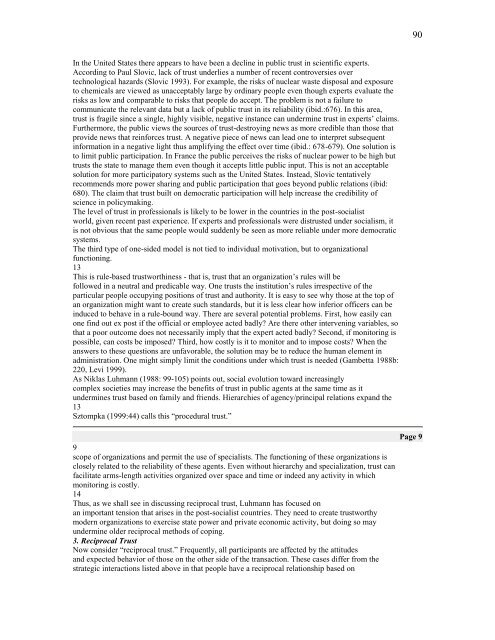FILSAFAT KORUPSI - Direktori File UPI
FILSAFAT KORUPSI - Direktori File UPI
FILSAFAT KORUPSI - Direktori File UPI
Create successful ePaper yourself
Turn your PDF publications into a flip-book with our unique Google optimized e-Paper software.
In the United States there appears to have been a decline in public trust in scientific experts.<br />
According to Paul Slovic, lack of trust underlies a number of recent controversies over<br />
technological hazards (Slovic 1993). For example, the risks of nuclear waste disposal and exposure<br />
to chemicals are viewed as unacceptably large by ordinary people even though experts evaluate the<br />
risks as low and comparable to risks that people do accept. The problem is not a failure to<br />
communicate the relevant data but a lack of public trust in its reliability (ibid.:676). In this area,<br />
trust is fragile since a single, highly visible, negative instance can undermine trust in experts‘ claims.<br />
Furthermore, the public views the sources of trust-destroying news as more credible than those that<br />
provide news that reinforces trust. A negative piece of news can lead one to interpret subsequent<br />
information in a negative light thus amplifying the effect over time (ibid.: 678-679). One solution is<br />
to limit public participation. In France the public perceives the risks of nuclear power to be high but<br />
trusts the state to manage them even though it accepts little public input. This is not an acceptable<br />
solution for more participatory systems such as the United States. Instead, Slovic tentatively<br />
recommends more power sharing and public participation that goes beyond public relations (ibid:<br />
680). The claim that trust built on democratic participation will help increase the credibility of<br />
science in policymaking.<br />
The level of trust in professionals is likely to be lower in the countries in the post-socialist<br />
world, given recent past experience. If experts and professionals were distrusted under socialism, it<br />
is not obvious that the same people would suddenly be seen as more reliable under more democratic<br />
systems.<br />
The third type of one-sided model is not tied to individual motivation, but to organizational<br />
functioning.<br />
13<br />
This is rule-based trustworthiness - that is, trust that an organization‘s rules will be<br />
followed in a neutral and predicable way. One trusts the institution‘s rules irrespective of the<br />
particular people occupying positions of trust and authority. It is easy to see why those at the top of<br />
an organization might want to create such standards, but it is less clear how inferior officers can be<br />
induced to behave in a rule-bound way. There are several potential problems. First, how easily can<br />
one find out ex post if the official or employee acted badly? Are there other intervening variables, so<br />
that a poor outcome does not necessarily imply that the expert acted badly? Second, if monitoring is<br />
possible, can costs be imposed? Third, how costly is it to monitor and to impose costs? When the<br />
answers to these questions are unfavorable, the solution may be to reduce the human element in<br />
administration. One might simply limit the conditions under which trust is needed (Gambetta 1988b:<br />
220, Levi 1999).<br />
As Niklas Luhmann (1988: 99-105) points out, social evolution toward increasingly<br />
complex societies may increase the benefits of trust in public agents at the same time as it<br />
undermines trust based on family and friends. Hierarchies of agency/principal relations expand the<br />
13<br />
Sztompka (1999:44) calls this ―procedural trust.‖<br />
9<br />
scope of organizations and permit the use of specialists. The functioning of these organizations is<br />
closely related to the reliability of these agents. Even without hierarchy and specialization, trust can<br />
facilitate arms-length activities organized over space and time or indeed any activity in which<br />
monitoring is costly.<br />
14<br />
Thus, as we shall see in discussing reciprocal trust, Luhmann has focused on<br />
an important tension that arises in the post-socialist countries. They need to create trustworthy<br />
modern organizations to exercise state power and private economic activity, but doing so may<br />
undermine older reciprocal methods of coping.<br />
3. Reciprocal Trust<br />
Now consider ―reciprocal trust.‖ Frequently, all participants are affected by the attitudes<br />
and expected behavior of those on the other side of the transaction. These cases differ from the<br />
strategic interactions listed above in that people have a reciprocal relationship based on<br />
90<br />
Page 9

















